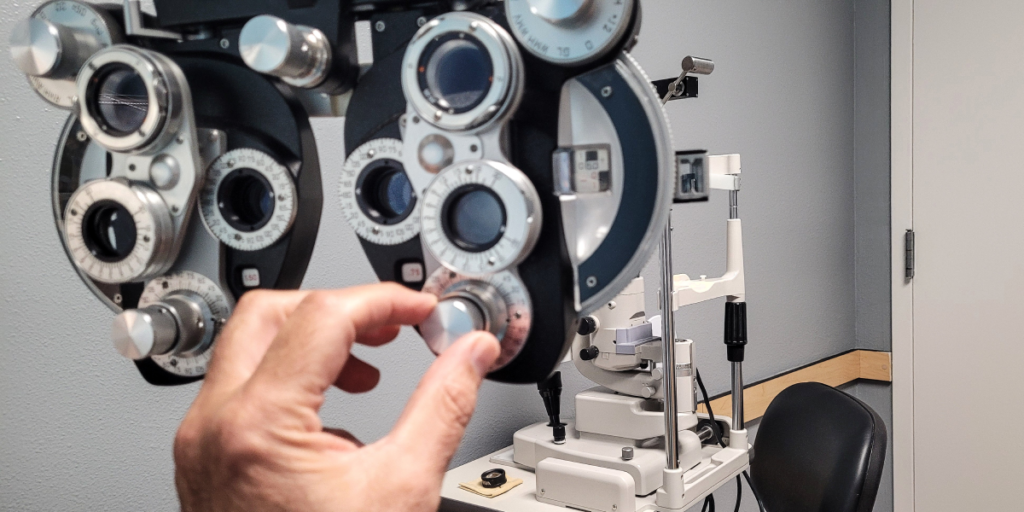Diabetic Eye Care

Patients that have been diagnosed with diabetes have a higher risk of developing other diseases including diabetic retinopathy, cataracts, glaucoma as well as other conditions that can lead to a loss of vision and blindness. A comprehensive diabetic eye exam will be able to check for eye problems caused by diabetes, including diabetic retinopathy, the leading cause of blindness in the United States.
Diabetic eye conditions typically develop without notice because they usually develop with no pain or noticeable loss of vision. Any damage that does occur may be significant before patients notice any of the symptoms. This is why it is important for diabetic patients to have an eye examination at least once a year and keep their blood sugar levels under control.
Symptoms of Diabetic Eye Disease
Not all diabetic eye conditions will have signs or symptoms. Some symptoms may appear only when the eye condition is in advanced stages, including the following:
- Blurry vision
- Dark spots or “holes” in vision
- Flashes of light
- An increase in the number of floaters
- Poor night vision
An annual and routine eye examination is important to help prevent the loss of vision and diagnose diabetic eye conditions early.
Diabetic Eye Examination
As part of a comprehensive eye examination, a visual acuity test with an eye chart will be conducted. Diabetes can cause changes within the eyes affecting the clarity of vision. If there has been a significant change in acuity, refraction may be performed to determine changes to a prescription. A tonometry test, to measure the pressure inside the eye, may also be conducted.
During the eye examination, drops will be administered to the eyes to dilate the pupils. The drops are painless and will enable a more thorough examination of the structures of the eyes to look for any signs of disease. During the examination, the retina and optic nerve will be examined with a special magnifying lens.
Diabetic Eye Conditions
While diabetic retinopathy is the most common cause of vision loss for diabetics, diabetes can cause several other eye conditions, including:
- Diabetic retinopathy
Diabetic retinopathy is the most common type of diabetic eye disease and the leading cause of blindness in the United States. Diabetic retinopathy is caused when the blood vessels inside the retina swell and leak fluid. It can also cause the abnormal growth of blood vessels on the retina’s surface.
- Diabetic macular edema
The fluid that has leaked from the retina can also leak into the center of the macula and cause swelling and blurred vision. The macula is the part of the retina that is responsible for sharp, straight-ahead central vision and for seeing color. As diabetic retinopathy progresses, the risk of developing macular edema increases.
- Cataracts
Cataracts can develop prematurely for diabetics with elevated blood sugar levels. - Glaucoma
Also known as “The Silent Thief of Sight”, glaucoma typically does not show symptoms until there is a permanent loss of vision. Glaucoma can damage the optic nerve of the eye. With diabetes, the potential for developing glaucoma doubles.
Treatment of Diabetic Eye Conditions
If treatment is needed for the early stages of diabetic retinopathy, an injection to slow down or improve vision may be recommended. If the disease has advanced, several laser surgical procedures may be performed to treat the abnormal or leaking blood vessels. Macular edema can also be treated with a laser surgical procedure to reduce the amount of fluid in the retina.
These procedures will not cure the diabetic eye conditions but they can slow the progression of the disease for patients with more advanced cases.
Pregnant diabetic women or women with gestational diabetes, should schedule an eye exam with the doctor during their first trimester to discuss the effects pregnancy may have on their eyes.
The eyes can be among the first parts of the body affected by diabetes. Maintaining control of blood sugar along with a regular routine of comprehensive diabetic eye examinations will help detect any problems and help save vision.
